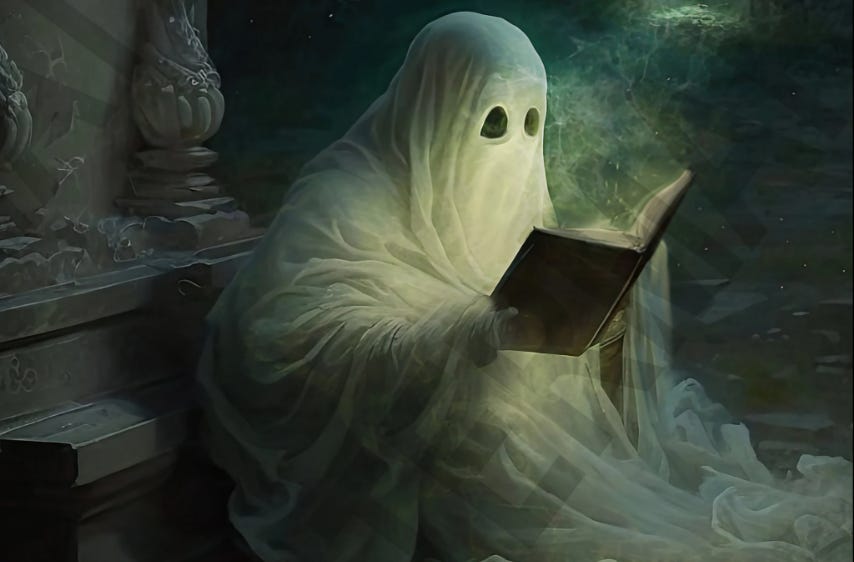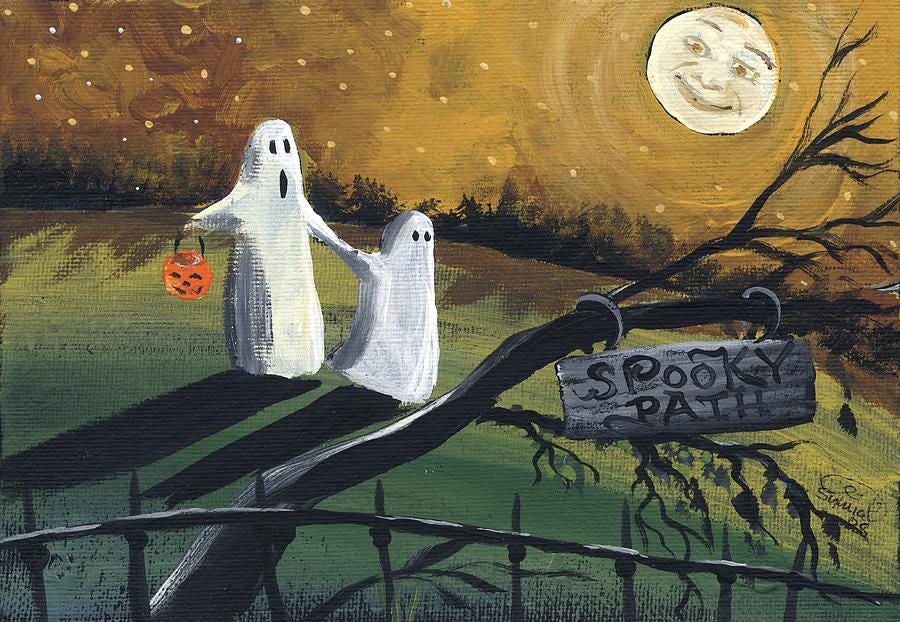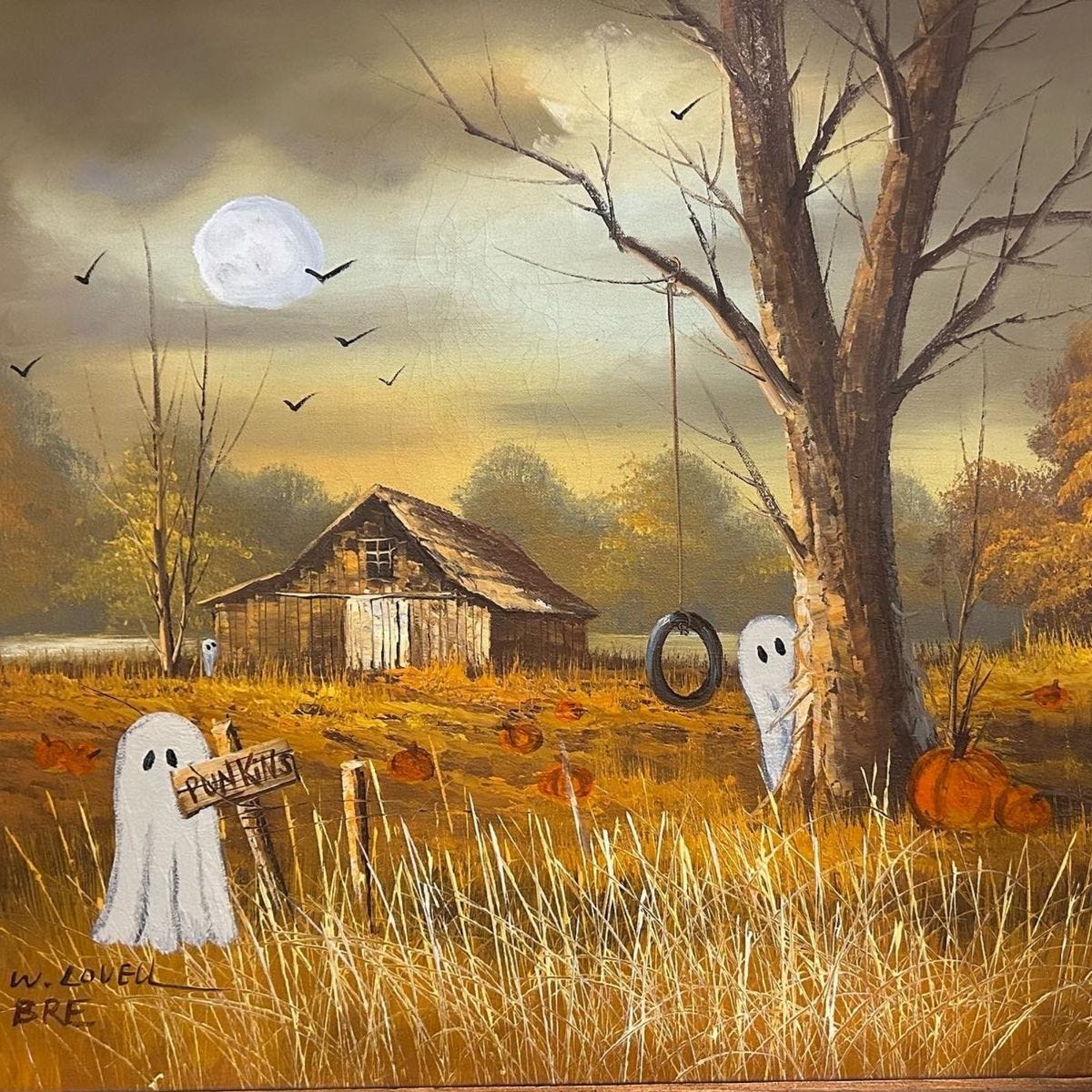P.C.M. Christ, Give Up the Ghost:
“The tree limbs out the window began to boast at one another in the moonlight, rollicking in the energy of the coming summer storm. Their silhouettes clashed across the wall, and A.R. watched transfixed, drawn into their movement as the warmth of the room departed, and reality began to swirl.
From the back of his mind, an overwhelming and incorrigible fire roared into being. Chained to his chair by the consuming vision, he could only watch the shadowy figures dance across the walls of his eyes, beckoning him toward acceptance, to give himself to the holes in the light. They constructed realities and semblance of truths, but the negative space spoke loudest and in that void, he swore he could sense but not see something more.
Hands trembling, dripping sweat, he stumbled then dragged himself toward the light switch, collapsing with relief as the light and shadows disappeared. Some truths are only discovered in the Dark.
He crawled, panting, back to his desk and mindlessly rolled a cigarette. With the storm raging on, he gazed at the shapeless, hulking forms of his bookshelves, then licked the paper closed. A brief flame haunted his features before he leaned back, sending smoke signals toward Heaven.”
—P.C.M. Christ, Give Up the Ghost
“Follow spiritual vagrant, Atticus Remington Scutt, through the hypnotic, uncanny saturations of the South as he searches for his cousin's killer, and discovers that The Devil has indeed come back to Georgia.”
—P.C.M. Christ
Free PDF:
mega.nz/file/VaU0iAqK#KUCwF_XG3el4henIceHLMZy0na-a29BI_lHVgjVJ7Lw
Amazon:
Twitter:
@plzcallmechrist
Substack:
Cthulhu Turns Right - Fictions by P.C.M. Christ (substack.com)
It’s always a pleasure to promote a debut novel, especially the debut novel of a longtime friend.
Give Up the Ghost is a fun, thoughtful book featuring beautiful prose, vivid characters, and an intriguing plot. It’s a startling mystery in the Southern Gothic tradition… which is to say, it’s a book physically located in the American South, which dares to frame itself with an aggressive sense of ownership and self-mastery, while exploring a highbrow, intellectual viewpoint on the sacrifices; suffering; tragedies; heroism of life at its most primal.
Life amid a stern, authentic world.
Give Up the Ghost is a fearsome story of murder, mystery, prophecy, romance, and revenge, which takes place under the shadow of Faulkner, and beneath the wings of angels.
The book is around 36,000 words, and I was reminded of various works as I immersed myself in this adventure — the poetic imagery of Faulkner, the plot-driven police procedural investigation of True Detective’s Season One, the symbolism and masculinity of Cormac McCarthy, and the philosophical and theological passages of William Peter Blatty’s “The Exorcist” — but PCM Christ’s “Give Up the Ghost” feels very much like its own thing. The book has its own clear authorial voice, identity, purpose, and characters.
Almost every line is beautiful; there’s a sheer poetry to the novel’s imagery and transitions. Reading this novel provides a lot to learn from in technical terms, for writers who yearn to craft their own stylistic passages. And one of the lessons I would caution is that this is an extremely difficult style to write in — it’s a heavy burden to make every incidental line or paragraph or transition or image or scene so stylistically pretty, and personally I would avoid the painstaking workload this meticulous approach demands… my own approximate rule of thumb is that one-third of a story’s prose should be poetic and the other two-thirds should be mechanical, perfunctory transitions which efficiently glide along without any particular emphasis… but there’s no denying how gorgeous PCM Christ’s prose can be.
At its best, the imagery and transitions and digressions are magnificent.
The novel is extremely ambitious, and I think that’s what stands out the most in reading Give Up the Ghost.
PCM Christ takes some big swings. Characters philosophize about the supernatural history of the universe… and the metaphysical justifications of existence… and various philosophical digressions are shared with an undercurrent of melancholy and fatalism — these are some of the best passages of the novel. It sounds pretentious to describe the story like this, but it’s cool and effective and somehow bucks convention, quite triumphantly. PCM Christ swings for a home run and he connects. Other writers would have missed. The conversations would have sounded fake, like pseudoacademic speeches inserted at random points into the scenes. But I was impressed he was able to hit such a difficult target. These philosophical musings are seamlessly incorporated into casual conversations. Incredibly, these speeches and passages work, remain fun, and resonate emotionally by delivering fascinating, highbrow interludes.
Philosophy counterbalances against horror; mystery; romance.
The plot advances.
There’s intrigue and violence and family drama, but I don’t want to spoil the best parts of the novel.
It’s a good read.
Give Up the Ghost is an engaging story, with a beguiling cast of characters. It’s a memorable, distinct, and consequential adventure.
One caveat I would add here: PCM Christ doesn’t pull any punches.
The murder scenes are gruesome, painted in grisly detail. There’s a lot of profanity, which averages around one obscenity per page during the first half of the novel. Some people will enjoy these aspects of the story, other readers will be willing to overlook the more sordid elements, and other readers will be disgusted.
PCM Christ writes with a purposeful edge.
Fiction is an escape, and not everyone wants to escape into a rural nightmare of torture and mayhem.
As for myself, I enjoyed the book.
It’s a very impressive debut novel, which hints at the tremendous developing talents of a creative visionary with a recognizable voice, a sharp perspective, a bold aesthetic sensibility, and a versatile technical command of a broad spectrum of narrative skills. Hopefully this manuscript marks one of the beginning chapters of a long, distinguished career.
Some of my favorite passages of the novel follow, which demonstrate beautiful imagery:
1.)
“It was still hotter than Hell, but the cicada’s reverberations were giving way to the staccato chirps of katydids and crickets underscored by the bellow of frogs, and the lightning bugs flickered like remnants of the day.”
—P.C.M. Christ, Give Up the Ghost
2.)
“The next morning, they took their breakfast on the back deck. A breeze lilted through, bringing the coolness of the night still nestled around the mountaintop in dew and rising mist. A wedge of cornbread, hot out the skillet and drizzled with sorghum, breakfast sausage heavy with red pepper and sage, a handful of blueberries and pecans with a pint of buttermilk.”
—P.C.M. Christ, Give Up the Ghost
3.)
“Son, if God’s messengers bring one the Word then one must accept it as the holy duty, blessing and burden placed upon them that it is. You do not share it to relieve yourself of it. You share it so that others might do with that Truth what God and they will. It is the unfortunate reality of Prophecy that it does not consider our feelings on the matter, nor does it offer consolation of any sort. In its own way, that is how and why it remains pure.”
—P.C.M. Christ, Give Up the Ghost
4.)
“It is no coincidence that mountain roads curve. Drivers and other citizens of the mountain don’t have a choice but to adhere to the contours of the Natural. The temperature began to rise as he neared the valley floor, and mountains became hills became fields became farms became exit- and onramps; the curves and lulls of synthesis turning into the bulwark of speed and efficiency that is the straight line. Improvement makes straight roads, but the crooked roads without Improvement, are roads of Genius. Wherever Mankind might be found in the form of Civilization, straight lines will abide. Never faltering, they exist as impositions of Divine Will and Stewardship; God’s hand working through Man’s to add to Nature what is not apparent: structure, meaning, purpose. Of course, even Divinity must be renewed against the chaos of cycles and the entropies of time; one’s very own Mandate of Heaven.”
—P.C.M. Christ, Give Up the Ghost
5.)
“Traffic slowed as he neared the Perimeter, and MARTA ran alongside as he passed the 285 loop, the King and Queen standing vigil, ever wary of Northward, then down 400 into the ‘city in the trees’. He loved that tree cover. As a boy, his mama had taken him to Stone Mountain and, standing on top, he could see every part of the World that mattered. Skyscrapers jutted out of rolling green clouds with the mountains in the distance watching the city with what had to have been silent appreciation for their time of movement and world-building was over. Passing through the geometric oddities of Buckhead and on to the corridor of Atlanta, he glanced up at the sky from a city’s point of view.
Mankind is the master of the line but hates the flatness of them, so he just keeps building up, something bigger, something higher, hoping the horizon has to end sometime. He wondered what God would have done if we had completed the Tower of Babel? What could He have done?”
—P.C.M. Christ, Give Up the Ghost
6.)
“That baby out there floating in the water, fish nibbling, decay, rot. God and science knows what else happens to a body in that forsaken condition. The media had tried to make it a brief human interest piece, but it was nothing but a spectacle veneered in tragedy.”
—P.C.M. Christ, Give Up the Ghost
7.)
“Low lighting, the strange, ethereal, alchemical nature of liquids inside glass, pastel colors, evolved over millennia to soothe blurred vision and heavy eyes, psychosomatic beauty.
A.R. nursed his nth beer, surroundings blurring to peripherals as he searched for meaning.
The thing about visions, it seemed, was any attempt to communicate them required communicating that you had had one in the first place. A gulf now divided his mind between the before and after, but another had been dug between him and his fellow Man.
Sheep. Goats.
He couldn’t call his daddy. All his life he’d seen Cillian handle things in his way, but the ways that had come before gave him no guidance.
Of course he could always keep it to himself, but there are things in this life from which one does not return. The temptation was there. Diagnose. Prescribe. Reduce. Labels somehow validating interpretations.
He looked up at the corner where the wall met the ceiling. Three vectors without the fourth, out and in simultaneously, three becoming one, the missing fourth a portal to eternity, a promise that was far from mirage if one only dove in headfirst. If the doors of perception were cleansed, everything would appear as it; infinite. Life was to give form to the void, and vision was to breathe new life into its nostrils. This was the charge of all Seers and Prophets. Narcissism. Arrogance. Delusions of Grandeur.”
—P.C.M. Christ, Give Up the Ghost
8.)
“The whiskey passed in silence. For the moment, gestures were enough, their vision beginning to reflect the swirling thoughts bottled in mind, a maelstrom of senses and interpretation thrown into chaos by the liquor until Truth or Sense could be divinated and spoken aloud, spoken without thought, before, after or during. Poetry, and perhaps truth, personal as it may be, finally unleashed from the confines of what-youthink-you-know into the subtlety of the known but never before spoken, articulated for the first time, their first breath being their first meaning.”
—P.C.M. Christ, Give Up the Ghost
9.)
“The Church of New Jerusalem was grand in its scale and believed its majesty to be in its claim to history, and so was reliant on it. Like all institutions, it had started small, local, novel through its dissidence and had grown through the enthusiasm of its converts. It spread its satellites throughout the world and, having reached the macro-limits of its expansion, there it stayed, resting on its laureled haunches, finding a sense of progress in bickering over doctrine, splinterings off, holy wars: self-righteousness through self-preservation.
Its final incarnations occurred when power was imbued with money instead of authority.
He could understand the impulse though. People giving of themselves to something bigger, mistaking it for something higher. As far as the priest, preacher or whatever went, Cillian had never talked about his days off the Mountain. A.R. pulled into the first of four stadium-sized parking lots and, thinking it garish to park closest to the building, moved down a few spaces before walking to the entrance. Above as Below, the sun and the asphalt burned.
He pushed through the gold-plated revolving doors and followed the etched bronze signs to the reception desk. Three fountains graced the foyer, fed from two second-floor waterfalls that flanked several glass elevator shafts. The series of ceiling-high, exterior windows was lined with olive trees, drip irrigation concealed within their branches. Two women sat behind a mixed-media desk of marble and ebony, one patting her head to scratch it.”
—P.C.M. Christ, Give Up the Ghost
10.)
—P.C.M. Christ, Give Up the Ghost
“She shielded her eyes, looked down the road and sighed, scrunching her nose. Her cheeks were blushed in the red-wine romance of a summer evening.”
11.)
“A.R. headed West, his eyes adjusting to the pink and orange rays of the sunset, paved across a blue so vast he wasn’t sure whether he was headed into it or away. Baseball sky. Like all beautiful things, it was fragile and ethereal, and the sun was forever committed to its daily death and shown prettiest in its last light, smearing the sky blazed-red in farewell, a gasp of awe, before what is made by Man permitted daily life to continue without it.”
—P.C.M. Christ, Give Up the Ghost
12.)
“There’s no crying in baseball. A kid ran the bases so hard his grin appeared windswept. A young pitcher bent himself, the ball and the laws of nature to his will. The pings of bats punctuated action and its potential, a breath’s width of anticipation in every movement.
Summer was proof that God loves baseball.
More than anything else on Earth, baseball mirrored the ebbs and flows of life, the poetry of it all. It hung there, far above spectacle, ritual and repetition embedded in every movement and lull; the pacing allowing for the presence of time. New life was found in each pitch, dynamism given to every exertion; a break in the face of formality revealed the Absolute in the passionate, violent experience of being.
Proof that energy could never die, only be contained and directed.
Mastery ultimately defined through control, and the narratives of lives told between decision and consequence.
He watched a little more and made small talk, then called Boss who didn’t pick up, so he called Maggie to check in, and she said Boss would be at work all night, and they were still at her mom’s house and she had no place for him there, but he was welcome to stop and stay their house. He replied that it was a nice night to sleep outside and, wishing her well, hung up.
He drove a little further down to an RV park and climbed into the bed of the truck where a canopy of trees and the city light obscured the Above from view. But still the stars shown and their companionship throughout life allowed belief that they were there and would be again, and there was a peace in his heart as he lay there far from Home with nothing to his name but his Life.
The vision came but without terror: a hearse, gleaming midnight, rolled, crackling around the curve of a red, dirt road, and the wind whispered its secrets through the saplings that lined the small path onto which the vehicle turned next where a white u-framed arch presided the entrance with rows of a white picket fence leading to nothing but a carpet of greenest green which swayed with the trees, and the sky was gray with clouds but for a speck.
A.R. watched the hearse from on High, struggling to see inside the tint, but it was dark and he had no eyes with which to see. The hearse neared a thicket and began turning round. He drew closer to the vehicle as it started in reverse and, looking behind, there was a shadowy void in the middle of the thicket, but thirsting Hellfire never licked at the hearse’s hindquarters, and no Host sang, nor Devils arrive as the hearse crossed the threshold and, going hood up, sunk slowly back from view.
A.R. reached but did not move or cry out for neither did what was Natural around him. He approached the edge and peeked over before plunging his head in as if to drink, and he was wrapped in a blanket of blackness that neither comforted nor stifled. His vision returned to the truck bed where the constellations remained above, having moved only slightly in their cycles.
—P.C.M. Christ, Give Up the Ghost










Congrats to PCM on the release and great prose excerpts here.
I wonder if that 30-40k range is a sweet spot for indie writers. Gut says yes.
big ups 👍 PCM and well done i will have 1 copy. thank you friend.